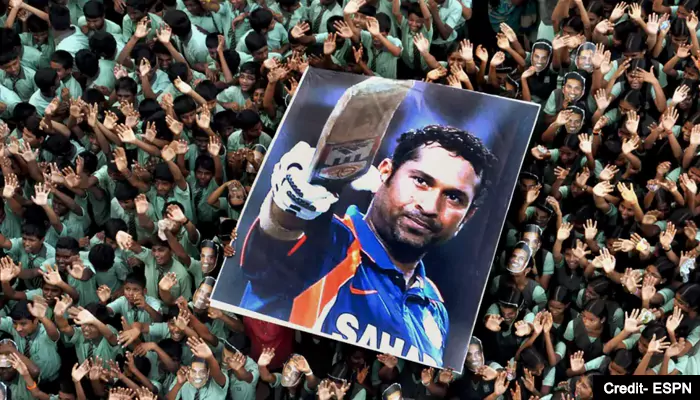
The day cricket's greatest run-maker carved history, even as India faltered against Bangladesh
On 16 March 2012, the Sher-e-Bangla National Stadium in Mirpur witnessed a historic event. A full house, filled with eager fans, watched Sachin Tendulkar achieve what no other batter had before - reaching his 100th international century. It was a moment that went beyond mere statistics, solidifying his reputation as cricket’s perpetual run-machine. Yet, in a twist of irony, the day that was meant to celebrate India's triumph turned into Bangladesh's night of glory.

Credit: ESPN
Opening alongside Gautam Gambhir, Tendulkar’s progress was cautious, even restrained by his standards. He watched Gambhir depart early for 11, before rebuilding with Virat Kohli. Their 148-run stand steadied India and gave the master room to script history. His half-century came in 63 balls; his hundred arrived off 139 deliveries.

Credit: ESPN
Tendulkar’s final score was 114 from 147 balls, with 12 boundaries and a solitary six. It wasn’t his most fluent innings, but it was an innings marked by patience and determination, aware of the weight of expectation. When Mashrafe Mortaza finally dismissed him in the 47th over, the stadium erupted — not just in celebration of a wicket, but in recognition of witnessing a world record.

Credit: ESPN
With Suresh Raina smashing a brisk 51 off 38 balls and Kohli’s 66 complementing Tendulkar’s century, India posted 289 for 5 in their 50 overs. Dhoni’s cameo of 21 not out from 11 balls added a flourish at the end. For Bangladesh, Mortaza was the standout bowler, conceding just 44 runs in his 10 overs while dismissing Tendulkar and Raina.
India’s total of 289 looked commanding on paper, but Mirpur had seen improbable chases before — and Bangladesh was about to script one of their most famous wins.

Credit: ESPN
Tamim Iqbal’s 70 from 99 balls set the tone, anchoring the innings with composure. Jahurul Islam (53) and Nasir Hossain (54) made crucial contributions, ensuring the required rate never spiralled out of control. The real hammer blow, however, came from Shakib Al Hasan. His 49 off just 31 balls, at a strike rate of over 158, broke India’s grip on the game.

Credit: ESPN
Bangladesh needed 90 runs from the final 10 overs, and with Mushfiqur Rahim’s unbeaten 46 off 25 balls, the home side surged past the target in 49.2 overs. They finished with 293 for 5, clinching a five-wicket win with four balls remaining - a victory that would later be remembered as a turning point in Bangladesh’s rise as a force in Asian cricket.

Credit: ESPN
For India, the day was bittersweet. They had witnessed their greatest cricketer etch a record that might never be matched, but the result stung. Tendulkar's 100th century could not prevent defeat, highlighting the cruel paradox of cricket - that individual brilliance does not always guarantee collective success.

Credit: ESPN
Tendulkar finished the tournament as one of India’s top scorers, but the 2012 Asia Cup belonged to Bangladesh in spirit. Their win against India demonstrated their growing confidence against the giants of world cricket, and it came on a night when the man revered as the “God of Cricket” reached his final peak.
Sachin's 100th international century - his 49th in ODIs - was more than just a number. It symbolised two decades of unwavering excellence, resilience under pressure, and the ability to carry the hopes of a nation on his shoulders.